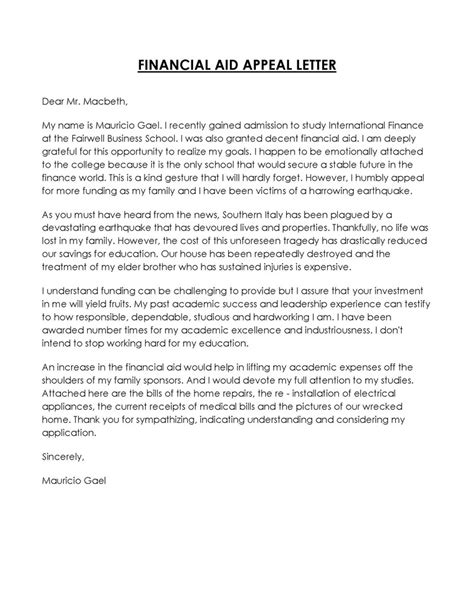Introduction

Applying for financial aid can be a daunting task, especially if you’re unsure where to start. An effective financial aid appeal letter can significantly increase your chances of receiving the support you need to pursue your educational goals. Here’s a comprehensive guide to help you write a compelling appeal letter that meets the specific requirements of your situation.
Understanding Financial Aid Appeals
Financial aid appeals are requests submitted to colleges or universities to reconsider or adjust the financial aid package you’ve been offered. This typically involves providing additional information or clarifying your financial circumstances to demonstrate your need for additional funding.
When to Write an Appeal
- Significant Financial Changes: If your financial situation has changed substantially since you submitted your initial financial aid application, you may qualify for an appeal.
- Errors or Omissions: If mistakes were made in your financial aid application or the institution overlooked relevant information, you can request a correction through an appeal.
- Special Circumstances: You may also appeal if you have experienced unusual circumstances, such as a medical emergency or job loss, that have affected your ability to pay for college.
Steps to Write an Effective Appeal
1. Gather Supporting Documentation
- Tax Returns: Provide copies of your most recent tax returns (for yourself and your family if applicable).
- Financial Statements: Include bank statements, investment accounts, and any other documentation that reflects your current financial situation.
- Proof of Income: Submit pay stubs, benefits statements, or other proof of your income.
- Evidence of Expenses: Detail any extraordinary expenses you’re currently facing, such as medical bills, childcare costs, or housing expenses.
2. Write a Clear and Concise Letter
- Opening Paragraph: State your purpose clearly and provide a brief overview of your financial situation.
- Body Paragraphs: Provide specific details about the changes or circumstances that have led you to request an appeal. Be honest, transparent, and provide supporting evidence.
- Closing Paragraph: Restate your request for additional financial aid and explain how it will impact your ability to attend the institution.
Tips for Writing an Appeal Letter
- Be Specific: Avoid general statements and provide specific examples to support your request.
- Be Professional: Use formal language and proofread your letter carefully for any errors.
- Quantify Your Need: Use numbers and figures to demonstrate the financial gap you’re facing.
- Consider a Personal Statement: If appropriate, include a separate personal statement that explains your goals and aspirations and how financial aid will help you achieve them.
Table 1: Common Reasons for Financial Aid Appeals
| Reason | Description |
|---|---|
| Income Changes | Significant decrease in income, job loss, or unexpected expenses |
| Dependent Changes | Changes in the number of dependents or their financial situation |
| Unexpected Expenses | Medical emergencies, car repairs, or other unforeseen costs |
| Errors on Application | Mistakes in reporting income, assets, or expenses |
| Special Circumstances | Natural disasters, family emergencies, or other events that have a major impact on finances |
Table 2: Supporting Documentation for Financial Aid Appeals
| Document | Importance |
|---|---|
| Tax Returns | Provides a detailed snapshot of your income and financial situation |
| Financial Statements | Shows your current assets, liabilities, and cash flow |
| Proof of Income | Verifies your current earning capacity |
| Evidence of Expenses | Demonstrates your financial obligations and expenses |
| Medical Records | Supports claims of medical emergencies or health-related expenses |
Table 3: Tips for Writing an Effective Appeal Letter
| Tip | Description |
|---|---|
| Be clear and concise | State your request and provide supporting evidence in a well-organized manner |
| Be professional | Use formal language and proofread your letter carefully |
| Be specific | Provide specific examples and data to support your request |
| Quantify your need | Use numbers and figures to demonstrate the financial gap you’re facing |
| Consider a personal statement | Explain your goals and aspirations, and how financial aid will help you achieve them |
Table 4: Words to Generate Ideas for New Applications
| Word | New Application |
|---|---|
| Unexpected | Applications for unexpected expenses or emergencies |
| Extraordinary | Applications for expenses that are not covered by traditional financial aid programs |
| Overlooked | Applications for expenses that were accidentally omitted from the original application |
| Life-changing | Applications for expenses that have a major impact on the applicant’s financial situation |
| Extraordinary | Applications for expenses that are not covered by traditional financial aid programs |
Conclusion
Writing a financial aid appeal can be challenging, but by following these steps and providing clear and compelling evidence of your financial need, you can significantly increase your chances of receiving additional support. Remember to be honest, transparent, and specific in your request, and provide the necessary documentation to support your claims. With a well-crafted appeal letter, you can unlock the financial resources you need to pursue your educational dreams.
